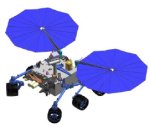Mars, Europa top planetary science mission report
Posted: Tue, Mar 8, 2011, 7:08 AM ET (1208 GMT)
 A report released Monday identified a Mars rover and Europa orbiter as the highest priority large planetary science missions for the next decade for NASA, but warned that tight budgets could preclude those missions from flying. The Planetary Science Decadal Survey report, performed by the National Research Council, identified the Mars Astrobiology Explorer Cacher (MAX-C), a rover designed to collect samples for a follow-on sample return mission, as the highest-priority large or "flagship" mission for the period 2013-2022. However, it recommended that MAX-C be flown only if its estimated $3.5-billion budget can be cut by $1 billion. The second highest priority mission is the Jupiter Europa Orbiter, an orbiter designed to study Jupiter's large icy moon Europa, but again stated that the mission should fly only if its estimated cost of $4.7 billion can be cut. The report recommended that smaller scale missions, such as those in the Discovery and New Frontiers program, be preserved at the expense of flagship missions. The study's leaders told planetary scientists at a conference in Houston on Monday, where the report was released, that under NASA's current projected planetary sciences budgets over the next several years there would be no room for any flagship missions.
A report released Monday identified a Mars rover and Europa orbiter as the highest priority large planetary science missions for the next decade for NASA, but warned that tight budgets could preclude those missions from flying. The Planetary Science Decadal Survey report, performed by the National Research Council, identified the Mars Astrobiology Explorer Cacher (MAX-C), a rover designed to collect samples for a follow-on sample return mission, as the highest-priority large or "flagship" mission for the period 2013-2022. However, it recommended that MAX-C be flown only if its estimated $3.5-billion budget can be cut by $1 billion. The second highest priority mission is the Jupiter Europa Orbiter, an orbiter designed to study Jupiter's large icy moon Europa, but again stated that the mission should fly only if its estimated cost of $4.7 billion can be cut. The report recommended that smaller scale missions, such as those in the Discovery and New Frontiers program, be preserved at the expense of flagship missions. The study's leaders told planetary scientists at a conference in Houston on Monday, where the report was released, that under NASA's current projected planetary sciences budgets over the next several years there would be no room for any flagship missions.
 A report released Monday identified a Mars rover and Europa orbiter as the highest priority large planetary science missions for the next decade for NASA, but warned that tight budgets could preclude those missions from flying. The Planetary Science Decadal Survey report, performed by the National Research Council, identified the Mars Astrobiology Explorer Cacher (MAX-C), a rover designed to collect samples for a follow-on sample return mission, as the highest-priority large or "flagship" mission for the period 2013-2022. However, it recommended that MAX-C be flown only if its estimated $3.5-billion budget can be cut by $1 billion. The second highest priority mission is the Jupiter Europa Orbiter, an orbiter designed to study Jupiter's large icy moon Europa, but again stated that the mission should fly only if its estimated cost of $4.7 billion can be cut. The report recommended that smaller scale missions, such as those in the Discovery and New Frontiers program, be preserved at the expense of flagship missions. The study's leaders told planetary scientists at a conference in Houston on Monday, where the report was released, that under NASA's current projected planetary sciences budgets over the next several years there would be no room for any flagship missions.
A report released Monday identified a Mars rover and Europa orbiter as the highest priority large planetary science missions for the next decade for NASA, but warned that tight budgets could preclude those missions from flying. The Planetary Science Decadal Survey report, performed by the National Research Council, identified the Mars Astrobiology Explorer Cacher (MAX-C), a rover designed to collect samples for a follow-on sample return mission, as the highest-priority large or "flagship" mission for the period 2013-2022. However, it recommended that MAX-C be flown only if its estimated $3.5-billion budget can be cut by $1 billion. The second highest priority mission is the Jupiter Europa Orbiter, an orbiter designed to study Jupiter's large icy moon Europa, but again stated that the mission should fly only if its estimated cost of $4.7 billion can be cut. The report recommended that smaller scale missions, such as those in the Discovery and New Frontiers program, be preserved at the expense of flagship missions. The study's leaders told planetary scientists at a conference in Houston on Monday, where the report was released, that under NASA's current projected planetary sciences budgets over the next several years there would be no room for any flagship missions.
Related Links:
| <<previous article | next article>> |
|
news in brief
|
|
|
|
news links
|
|
Friday, January 30
Mission Success: Rocket Lab Launches Korean Earth-Imaging Satellite, Completes 2nd Launch in 8 Days
Rocket Lab — 5:11 am ET (1011 GMT) York Space Stock Rises After IPO
Wall Street Journal — 5:11 am ET (1011 GMT) York Space Systems Debuts As $4.4B Publicly Traded Company
Aviation Week — 5:10 am ET (1010 GMT) Europe needs ‘quantum leap’ in space innovation, says ESA chief
Science Business — 5:10 am ET (1010 GMT) Dentistry at a distance: a 650 km checkup via satellite
ESA — 5:09 am ET (1009 GMT) |